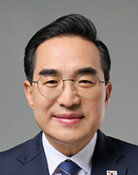U.S. Sees Benefits in Command Shift
U.S. Sees Benefits in Command Shift
Posted September. 16, 2006 03:50,
The view of U.S. President George W. Bush on transferring wartime command control to Seoul has dramatically changed in the last couple of months. Right after the summit talk, President Bush said to reporters that the two leaders reached a consensus, and the wartime control issue should not be politicized. However, analysts say his statement is a strategic gesture to quell criticism from Korea.
In fact, President Bush had not received any report regarding wartime control transfer up until early August 2006. U.S. Secretary of State Condoleezza Rice and U.S. National Security Advisor Steven Hadley also belatedly received reports on the matter (in September 2006), a source in Washington said.
It is a well-known fact that the Pentagon has been taking the initiative in negotiating the wartime transfer issue. However, even the Pentagon was not sure until June 2006 whether Seoul would be capable of handling the burden once it takes over wartime control. However, it finally notified Cheong Wa Dae on the month that the U.S. would like to return wartime control to South Korea in 2009. The U.S. carefully calculated profit and loss during that period. Having drawn up a conclusion that it is profitable for the U.S., the U.S. started to push the plan, the source said.
U.S. Defense Secretary Donald Rumsfelds political calculation was also behind the Pentagons decision. Rumsfeld wanted to pull out ground troops from South Korea to dispatch them to Iraq where the U.S. has been suffering from a shortage of soldiers. Analysts point out that Rumsfeld no longer feels the obligation of allies with Seoul as his affection toward South Korea has melted away.
President Bush formally expressed his approval of the transfer on August 15, 2006 during the Tank Conference, a meeting with senior military leaders at the Pentagon. President Bush asked Rumsfeld three times whether the transfer issue was related to the anti-U.S. sentiment in Korea and Rumsfeld repeatedly said, No, a source from the Pentagon said. U.S. President Bush finally asked Rumsfeld whether it was beneficial for national interest and Rumsfeld said, Yes. That is what happened on the day before President Bush instructed Rumsfeld to push the transfer, the source added.
Experts believe President Bushs remark that the wartime control issue should not be politicized holds many strategic implications. It suggests that President Bush wants to clarify his intention that the decision was not influenced by his emotional feelings against President Rohs administration but based on military assessments. We expected such remarks through comments of U.S. Ambassador to Korea Alexander Vershbow and the fine-tuning process with the U.S., a government official said on Friday.
srkim@donga.com





![[단독]“거부도 못해” 요양병원 ‘콧줄 환자’ 8만명](https://dimg.donga.com/c/138/175/90/1/wps/NEWS/IMAGE/2026/03/02/133450041.2.jpg)

